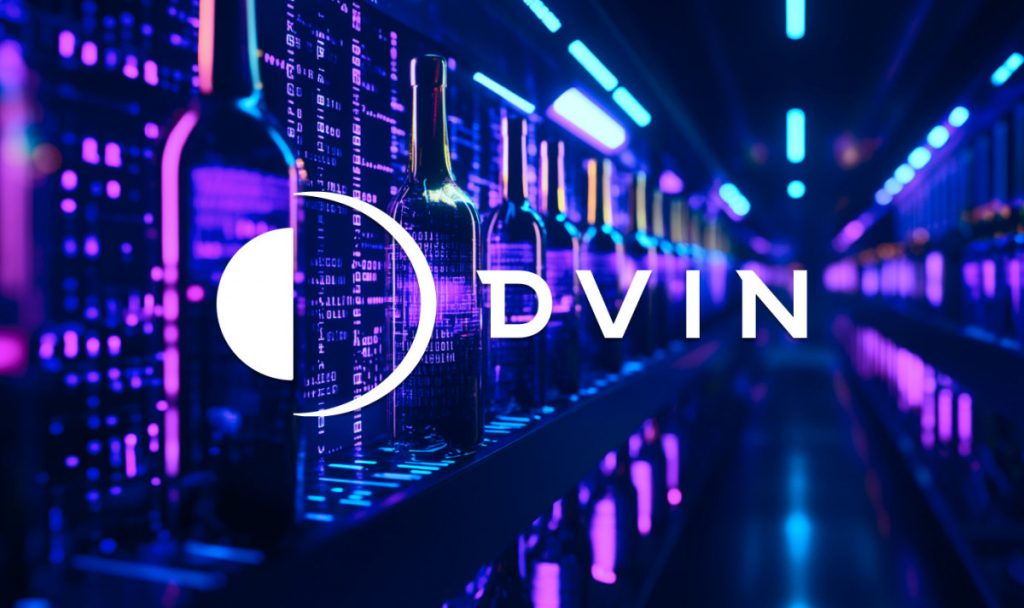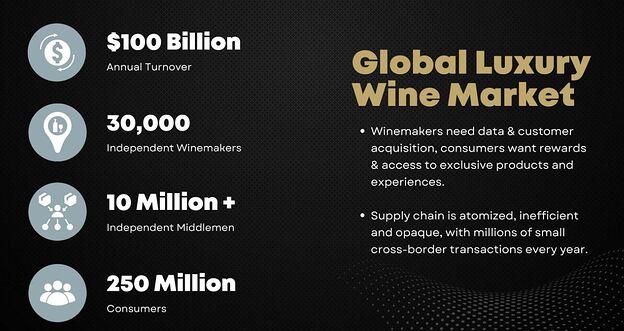Achieving Transparency in the Wine Sector Through Innovative Decentralized Technologies
In Brief
The luxury wine market, which has historically depended on its exclusivity and prestigious reputation, faces increasing hurdles in an era dominated by data and fragmentation. However, technologies like blockchain present innovative solutions by fostering transparency, simplifying transactions, and enhancing collaboration throughout the entire supply chain.

How Decentralized Technologies Propel the Wine Sector Forward
If you're currently reading this, there's a good chance you haven't seen a commercial for luxurious wines. You're unlikely to catch one during a TV ad break, nor will you encounter it in magazines or on your social media feeds. This raises a pivotal question: how do luxury wine brands attract new clientele without relying on conventional advertising methods?
This situation arises because the luxury wine sector has historically thrived on its reputation for exclusivity and the power of word-of-mouth. However, this approach struggles to adapt in our increasingly data-centric environment.
In addition to marketing challenges, the sector grapples with broader systemic complications due to fragmentation. From the vineyard to the store shelf, the wine industry is incredibly segmented. This fragmentation leads to inefficiencies and limits winemakers' access to consumer insights, operational oversight, and control over their supply chains.
Decentralized technologies, particularly blockchain, provide a compelling answer to these challenges. They have the power to promote transparency, facilitate smoother transactions, and enhance communication within the wine industry. By tackling issues of authenticity, provenance, and financial exchanges, decentralized technologies can be truly revolutionary for luxury wine producers.

Bridging the Gap Between Winemakers and Consumers
When you open a prestigious bottle of wine, it’s likely that it was crafted years ago by someone located thousands of miles away. This disconnect between production and consumption is a unique aspect of the wine industry and presents significant challenges to winemakers. Unlike most products, the experience of wine is often delayed for years.
Think about it: consumers might wear a new shirt the very same day they buy it, drive a new car right off the lot, or devour an avocado within days of purchase. Yet, with wine, it often finds itself stored away for years before being uncorked.
This lag complicates winemakers' efforts to obtain real-time feedback about the performance of their creations. They frequently depend on fragmented data from distributors or retailers, leaving them uncertain about their clientele's preferences, opinions, or evolving tastes. By the time someone finally enjoys a bottle, market trends may have shifted, leaving the winemaker in the dark.
In contrast, other sectors do not contend with this issue. A distillery can access immediate depletion reports reflecting sales of their products across various retail settings globally. This visibility enables them to refine marketing tactics, better understand consumer demographics, and optimize supply chains. Winemakers, on the other hand, often struggle to grasp who their customers are or how they feel about the wine they make.
Combating Counterfeit Wines and Ensuring Authenticity
The proliferation of counterfeit goods in the wine sector is a pressing concern, particularly affecting the market for rare collectible wines that can command prices in the thousands. Fake bottles and altered labels deceive even the savviest of collectors and auction houses, leading to eroded trust and a tarnished reputation within the industry.
By implementing blockchain technology, the journey of each wine bottle from vineyard to consumer can be comprehensively tracked. This digital ledger follows the product's journey at every stage, ensuring that all harvest, bottling, and distribution events are recorded, and preventing any tampering with this information. Consumers can quickly scan a wine label to confirm its authenticity, bolstering confidence in the product's legitimacy.
Blockchain effectively certifies authenticity, providing an essential layer of trust for high-end collectors and investors alike. In markets susceptible to fraud, such as China, blockchain serves as a tool for confirming provenance, ensuring only genuine bottles reach consumers and maintaining the integrity of the wine sector.
One of the ongoing hurdles in the wine industry is monitoring bottles post-departure from the vineyard. The lack of transparency regarding a delicate product that can sustain damage during transport is a consistent issue.
Vino to dVIN
Decentralized technology can provide comprehensive tracking along the distribution chain, ensuring traceability and transparency every step of the way. The information gathered can assist winemakers in resolving potential supply chain issues, making informed choices regarding pricing and distribution, and fostering closer relationships with consumers.
Utilizing blockchain allows winemakers to track significant data such as the temperature during shipping for every bottle in the distribution chain.
A digital record could document details at each phase—recording temperature during transit, time spent in storage, and conditions while on retail display.
Such transparency empowers winemakers and consumers alike to be assured that the wine has been handled properly and maintained its quality throughout its journey. Any instances of temperature fluctuations during shipping can be pinpointed to their specific location in the supply chain, facilitating easier resolution of disputes and the prevention of future errors.
Distributors and retailers benefit from clear distribution histories, which attract high-paying collectors. Blockchain-enabled provenance not only ensures authenticity but also provides reassurance that the wine has been cared for correctly.
Smart Contracts and Digital Currencies: The Future of Transactions
Beyond tracking the supply chain, decentralized financial transactions can revolutionize the wine industry. The global wine market encompasses millions of low-value transactions involving retailers, middlemen, and small producers. However, these transactions often encounter issues like counterpart risk, hefty bank fees, foreign exchange (f/x) fluctuation, and delays in settling international payments.
The sheer number of small, independent operators involved stirs up significant financial pressures within the field.
A promising solution resides in combining smart contracts with digital currencies. Smart contracts are automated agreements that execute transactions based on established parameters—such as confirming delivery—thereby removing the necessity for intermediaries like banks. This shift could lead to decreased costs and a reduction in fraud risk.
Digital currencies promise to resolve complications tied to currency exchange and international payment settlements. Transfers using digital currencies occur instantly, facilitating faster closures and reduced fees. This is especially beneficial for smaller wine producers aiming to sell internationally but lacking the financial frameworks to tackle complex global transactions.
By adopting decentralized finance, the wine industry stands to enhance transaction efficiency, lower costs, and minimize risks. This shift would enable smaller producers to reach new markets and better compete against larger brands.
A transformation is brewing in the wine sector. While respecting time-honored traditions, the integration of cutting-edge technology is necessary to enhance supply chain transparency, address the issue of counterfeiting, and streamline global transactions. Embracing decentralized technologies could empower winemakers with the insights required for smarter and more strategic business decisions.
The Future of Luxury Wine
This would aid in securing the authenticity and quality of their offerings, nurturing consumer trust, and optimizing operations from vineyard through to table service. Simultaneously, consumers would experience heightened transparency and assurance regarding the wines they choose.
Decentralized technology is pivotal in guiding the wine industry away from traditional distribution routes, fostering the craftsmanship and legacy of high-end wines in alignment with modern market demands. In data-driven industries, effective decisions stem from accurate information. Adopting decentralized solutions in winemaking could create a new paradigm of transparency, trust, and operational efficiency.
Please keep in mind that the content shared on this page is not designed to serve and should not be interpreted as legal, tax, investment, financial, or any other form of guidance. It’s crucial only to invest what you can afford to lose and to seek independent financial counseling if you have any uncertainties. For further insights, we recommend consulting the terms and conditions and the help resources made available by the issuer or advertiser. Metaverse Post strives to present accurate, objective reporting, yet market circumstances are subject to change without prior notice.
Disclaimer
In line with the Trust Project guidelines The Wine Sector Can Achieve Transparency Through Decentralized Technologies - Metaverse Post







